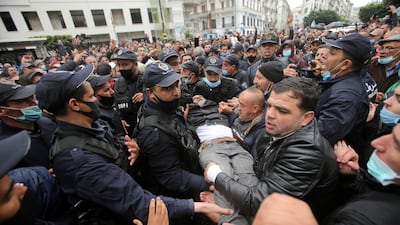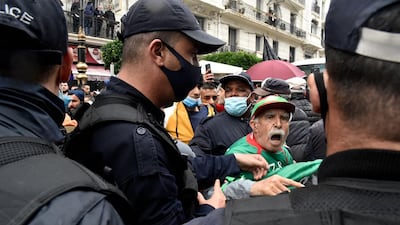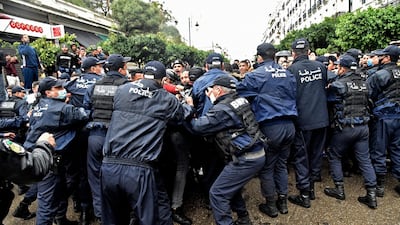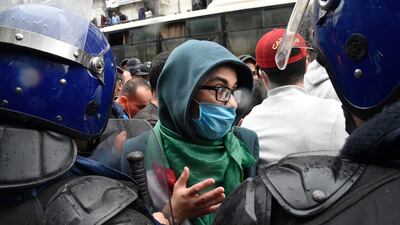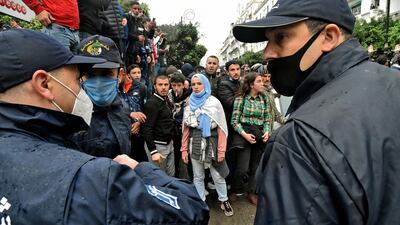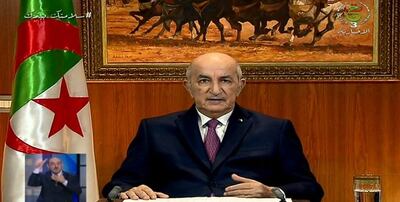Algerian activists dismissed President Abdelmajid Tebboune's long-awaited dissolution of parliament and cabinet reshuffle as they marked the second anniversary on Monday of mass protests that ousted his long-serving predecessor.
"These decisions don't satisfy us," civil rights lawyer Mustafa Bouchachi told The National. "The regime is only throwing dust in the eyes through taking such measures on the eve of the second anniversary of the protests."
Mr Tebboune announced that he was dissolving parliament in an address to the nation last week. Three days later he conducted a limited government reshuffle that kept the prime minister and left major portfolios untouched.
The president also announced the release of dozens of political prisoners and jailed activists from the Hirak protest movement, which began on February 22, 2019 and helped sweep president Abdelaziz Bouteflika from two decades in power.
At least 35 prisoners have been released so far, according to rights activists who say that more than 90 people, including activists, social media users and journalists, were taken into custody in connection with the Hirak movement.
“Some of the activists got out of prison by a presidential pardon and others by a conditional release. I am saddened by the state of the Algerian judiciary today that took orders from the political elite, the first time to prosecute the activists and then to release them,” Mr Bouchachi said.
“It’s used as a tool by this totalitarian regime ruling Algeria today.”
Mr Tebboune's televised speech came after thousands of Algerians rallied last Tuesday in the northern town of Kherrata, regarded as the cradle of the Hirak movement, to protest against worsening economic conditions and the government's mismanagement of the coronavirus crisis and its effects.
Demonstrators carried Algerian and Berber flags and shouted slogans against the military and Mr Tebboune.
"A civilian state, not military. Freedom of the press and of expression. An independent judiciary," read one banner.
On Sunday Mr Tebboune named a new energy minister for the Opec-member country, with Mohamed Arkab, a former mining minister, replacing Abdelmadjid Attar, the presidency said.
Industry minister Ferhat-Ait Aliwas was let go, as well those heading a handful of other ministries, including water, tourism and public works.
Among those keeping their posts were Prime Minister Abdelaziz Djerad and Justice Minister Belkacem Zeghmati.
A date for parliamentary elections has not been set, but the vote should take place within three months, according to the constitution. The deadline can be extended once for another three months.
"Announcing the date of the elections is a step that's more important than dissolving the parliament. What Tebboune announced is an incomplete and immature step and totally out of the political context," political writer and analyst Kamel Mansari told The National.
Mr Tebboune, 75, a former prime minister under Mr Bouteflika, was elected president in late 2019 in a poll boycotted by the protesters. Official data put the turnout at only around 40 per cent.
His recurring medical trips abroad in recent months for vaguely described illnesses have added to Algerians’ concerns and sent a wave of uncertainty across the nation that was ruled for six years by a de facto elite covered by the shadowy presence of an ailing Mr Bouteflika.
Mr Tebboune made two trips to Germany since October for treatment for Covid-19 complications, according to presidency statements. The first one lasted more than two months.
“The president and his government targeted the political effect of such announcements on the street to convince people against protesting on Monday,” Mr Mansari said.
The government did not leave anything to chance.
Security forces cordoned off the Algerian capital and police in uniform and in plain clothes spread on all its main streets, according to activists.
Opposition analysts and figures were shunned by all the private and public media outlets in the country, they said.
“These measures show that the regime has no good intentions and doesn’t want to listen to the demands of the Algerian street and build a real democratic state,” Mr Bouchachi, the civil rights lawyer, said.
“The regime wants to deceive the public into believing that things are changing but in fact what is happening is just a redecoration of the facade of the authoritarian regime,” he said.
“This will only lead to deepening the political crisis while already suffering from a financial one.”
Algeria’s overall budget deficit deteriorated to minus 9.6 per cent of its GDP in 2019, owing to a decline in hydrocarbon revenue and a rise in capital expenditure.
Oil revenue accounts for 60 per cent of the state budget and 94 per cent of total export revenue.

